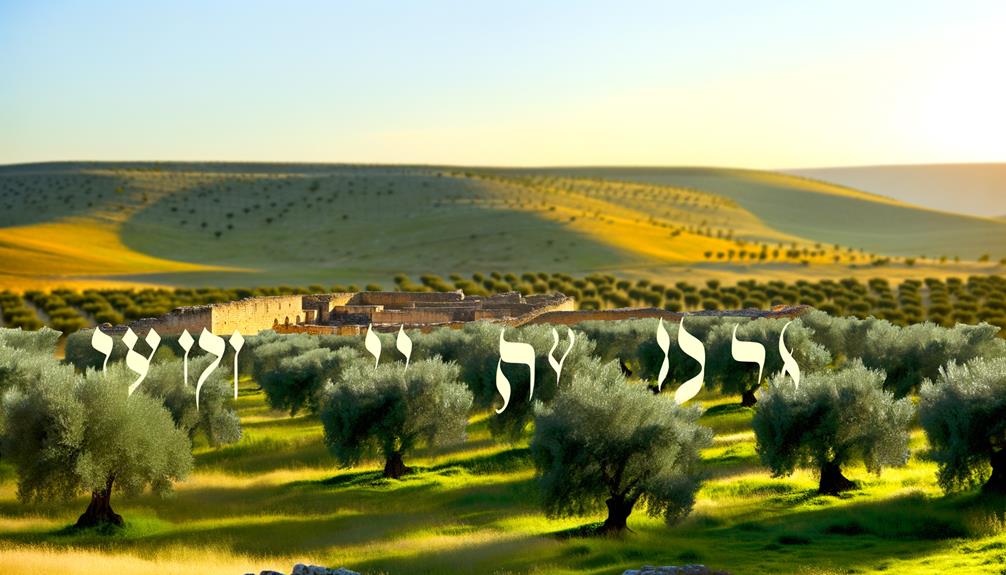Hur Name Meaning in Hebrew
In Hebrew, 'Hur' translates to 'hole' or reflects connotations of 'whiteness,' possibly derived from 'white linen.' This name carries deep historical roots and fits within ancient Hebrew naming conventions. Biblically, Hur is known for aiding Moses in the battle against the Amalekites and being a trusted leader left in charge of the Israelites.
His legacy extends to his grandson Bezalel, who played a pivotal role in constructing the Tabernacle. Hur exemplifies leadership, support, and cultural impact on ancient Israelite society.
By exploring further, you'll uncover more about his significant contributions and lasting influence.

Key Takeaways
- 'Hur' in Hebrew translates to 'hole' or 'cavern.'
- The name 'Hur' carries connotations of whiteness, possibly from 'white linen.'
- Hur's name reflects dual historical and cultural significance in ancient Hebrew.
- In the Bible, Hur supports Moses and is the grandfather of Bezalel.
- Hur symbolizes leadership, responsibility, and lasting cultural impact in Israelite history.
Etymology and Translation
The etymology of the name 'Hur' in Hebrew reveals a rich tapestry of meanings and historical significance that can be traced back to ancient texts and traditions.
In Hebrew, 'Hur' (חוּר) can translate to 'hole' or 'cavern,' but it also carries connotations of whiteness, possibly derived from the word חור (chur), meaning 'white linen.' This duality reflects the multifaceted nature of ancient Hebrew naming conventions, where a single name could embody various attributes or physical descriptions.
When you explore into the linguistic roots, you’ll find that this name isn’t just a label but a descriptor laden with cultural and symbolic weight. Understanding these nuances enriches your appreciation of its historical depth. As you delve deeper into the etymology, you uncover connections that reveal how language evolves and reflects societal values. For instance, the chedorlaomer meaning in hebrew carries implications of conflict and leadership, encapsulating a narrative that transcends mere identification. This layered understanding invites you to see the name not just as a static identifier but as a living expression of the culture and history it embodies.
Biblical References
Exploring the biblical references to the name 'Hur' reveals its important roles and appearances in key scriptural narratives.
First, Hur is mentioned in Exodus 17:10-12, where he assists Moses by holding up his hands during the battle against the Amalekites.
Second, in Exodus 24:14, Hur, alongside Aaron, is left in charge of the Israelites while Moses ascends Mount Sinai.
Third, Hur is identified as the grandfather of Bezalel, the chief artisan of the Tabernacle, in Exodus 31:2.
These instances demonstrate:
- Leadership: Hur is entrusted with pivotal responsibilities.
- Support: He provides essential aid in critical moments.
- Legacy: His lineage contributes significantly to Israelite worship practices.
Understanding Hur's biblical references enriches your appreciation of his role.
Historical Significance
Understanding Hur's biblical references enriches your appreciation of his role. Moving from biblical narratives to historical contexts, examining Hur's historical significance reveals how his actions and lineage influenced broader Israelite society.
Hur, often identified as a leader of the tribe of Judah, played pivotal roles during key moments of Israelite history. His support of Moses during the battle against Amalek and his involvement in the construction of the Tabernacle demonstrate his significant leadership and spiritual influence.
Moreover, Hur's lineage, believed to include influential figures like Bezalel, the chief artisan of the Tabernacle, underscores his lasting impact on Israelite culture and religious life. By understanding Hur's historical significance, you gain insights into the foundational structures of ancient Israelite society.
Cultural Impact
How does Hur's legacy continue to influence modern Jewish cultural and religious practices?
Hur's story resonates deeply within the Jewish community, serving as a touchstone for values and traditions.
You'll find his influence in several key areas:
- Leadership and Responsibility:
Hur's role in supporting Moses during the battle against Amalek underscores communal support and shared responsibility.
- Courage and Sacrifice:
His bravery in standing up for his beliefs during the Golden Calf incident serves as a moral compass for ethical conduct.
- Community and Collaboration:
Hur's partnership with Aaron highlights the importance of teamwork and unity in religious service.
Notable Figures
Hur's legacy not only permeates cultural practices but also reverberates through the lives of notable figures who exemplify his values and principles. For instance, in the biblical narrative, Hur stands alongside Moses and Aaron, supporting Moses' arms during the battle against the Amalekites. This act of unwavering support and leadership is mirrored in historical figures who demonstrate similar steadfastness.
Additionally, artists and authors often draw inspiration from Hur, portraying him as a symbol of resilience and integrity. By embodying these attributes, Hur's namesakes and admirers continue to uphold the virtues of collaboration and moral strength. Understanding Hur's impact on these individuals helps you appreciate the enduring significance of his character in both ancient texts and modern interpretations.
Conclusion
As you explore into the depths of the name 'Hur,' imagine walking through the rich tapestry of ancient Hebrew culture. Each thread tells a story of strength, valor, and divine purpose.
From its etymological roots to its biblical and historical significance, 'Hur' isn't just a name—it's a legacy woven into the fabric of time.
Understanding its cultural impact and notable figures brings you closer to a world where every name holds profound meaning and timeless influence.






